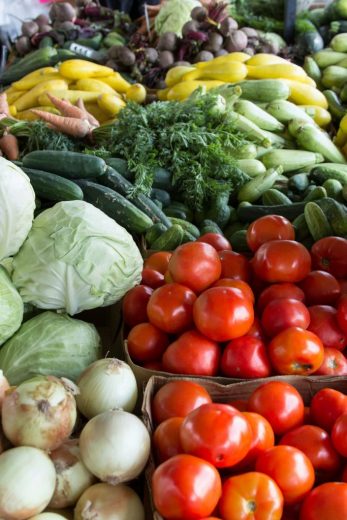An entrepreneur takes the power of healthy soils from local farms—and delivers it to people’s doorsteps
By Roberta Attanasio
All around the world, champions of regenerative farming are spearheading new projects in their communities—bringing the marvels and potential of healthy soils to everyone’s everyday life. We need them! Few of us realize that—because of industrial farming practices—most of our soils are sapped, devoid of life and nutrients.

Healthy soils, instead, are a bubbling universe of microbes and other organisms that work all together—creating a beautiful and efficient web of lively interactions. They all provide nutrients for exuberant plant growth, and therefore for our own growth and health. But how can we fully enjoy the products and benefits of regenerative farming and healthy soils during the still ongoing COVID-19 pandemic?
Enter Elissa Larson. A former Executive Chef, regenerative enthusiast and entrepreneur based in Holly Springs, Georgia, Larson delivers dazzlingly fresh, plump, colorful and—of course—regeneratively grown vegetables to people’s doorsteps. In 2019 she took a course in regenerative soil practices from Kiss the Ground and loved every moment of it.
Inspired by the course, and out of her love for the planet and community, she started The Woodstock CSA. All around the country, Community Supported Agriculture (CSA) is rapidly becoming a popular way to buy local, seasonal food directly from farmers. When restaurants closed because of the pandemic, so many regenerative farmers she knew had nowhere to sell all the bounty they were still producing. Now, The Woodstock CSA delivers lavish boxes of freshly harvested vegetables to the homes of people who subscribe to a weekly or monthly membership.
Larson advocates regeneration and diversity, which are—as she says—the two pillars she often shouts from the rooftops. “Diversity in our food, biodiversity in our soils, and in our perspectives, etc. are so massively important. With regeneration, it’s been interesting to observe the evolution over the years from sustainability and ‘net zero’ thinking (which is basically do less harm), to the regenerative mindset of not only doing less harm, but adding more good. I’ve loved that concept for so long. Regenerative farms focus on regenerating soils, feeding the microorganisms in the soil to produce more nutritious food.”
While taking the Kiss the Ground course, Larson had many aha moments. “I highly recommend the course as a great introduction to anyone interested in regenerative farming or environmentalism. One of the biggest aha moments came with the realization that there is still so much we don’t know about our soil. We only recently learned about glomalin in the ‘90s and its massively important role in the exchange of nutrients between plants and the soil. Glomalin is a sticky substance that coats the hyphae (little hairs) on mycorrhizal fungi. Mycorrhizal fungi are ancient fungi that aid plants in the absorption of nutrients. The symbiotic relationship is so beautiful, and is something that is easily destroyed or damaged via tilling and chemicals. Being a naturalist and someone who has studied nutrition and food since childhood, this information resonated with me because plants with more nourished soil and root systems grow healthier and more nutritious food. “

Notably, she originally took the course to deepen her environmental knowledge, but walked away with a deepened relationship to her food. Larson also took with her the inspiration to eventually start the Woodstock CSA once the COVID-19 pandemic hit the world.
“A CSA is typically run by a farmer so my first thought was, am I even qualified to do this? What makes me think that I can do this better than other people who have lived their entire lives in this field? I definitely had to change my perspective. I no longer wanted to compare myself to the farmers themselves and instead I decided to view myself as a supporter of the local economy and a helper to their cause. This wasn’t an easy hurdle to overcome and I definitely need to give a big shout out to my number one supporter which is my partner, Hayden. He pushed and encouraged me to start this and has continued to be by my side as my number one salesman ever since. There really isn’t a better, scarier, exciting, or more nerve wracking feeling than stepping into a field that you absolutely love but have only been on the sidelines supporting. Once I officially decided to put pen to paper and get this project going it was an incredibly empowering and actualizing moment where I felt that, yes, I did belong there. Yes, I can do something good. And the feeling hasn’t stopped since.”
“At the beginning, like any new venture, there was a mixture of curiosity and slight confusion about what exactly I was doing from both the farmers and community. But subscription-based models have already completely integrated themselves into our everyday lives, so once the community realized that they could subscribe to a local case of fantastic produce, it really started to sell itself. Most small businesses live off of the generosity of friends and family at first and we were no exception. However, I am proud to say that we branched out quickly and we have a small but very dedicated customer base that is eager to share our product with their own friends and family. We are immensely blessed to have our customers and we will always be indebted to them.”
The Woodstock CSA website will launch soon. In the meantime, head to Instagram (@TheWoodstockCSA) or call/text 404-563-9208 for pricing or any other questions. Hours of operation are 9-5 weekdays, and 9-12 weekends.



